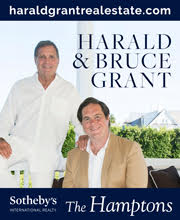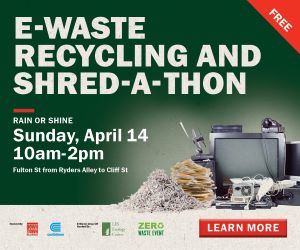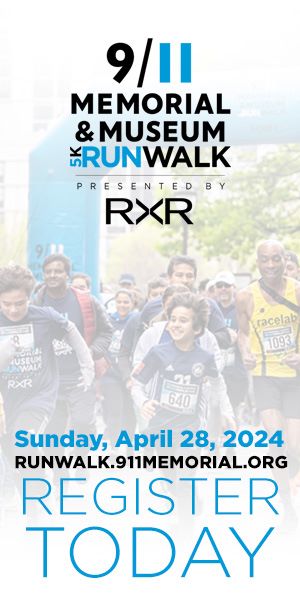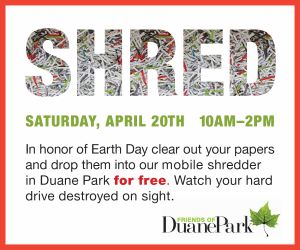Categories
Left column house ads
Remembering 9/11: Neighbors look back on that day, 20 years ago
September 9, 2021 Arts & Culture, Community News
To commemorate the 20th anniversary of 9/11, I asked several neighbors to recall that day and their experience, and I will run their stories over the next three days. To follow: Barbara Stratton, Zesty Meyers and Magee Capsouto.
…………………………
Barbara Stratton is the longtime owner of Cafe Clementine, which then was called Columbine and was on the corner of West Broadway and White.
That Tuesday was a blur amidst horrific clarity. Ice blue sky, earth shaking bang, then silence, smoke, sirens, shock. Repeat.
Wednesday morning, crossing police lines to enter my shop Columbine on White Street, there was a small crowd of neighborhood people gathered at the door ready to help. They made hundreds of sandwiches, heated soup, brewed coffee and packaged food for the staging area at Stuyvesant High School. Teens on bikes from the high school rode for hours delivering food for the responders The kids returned reeking of the towers’ smoke, yet they continued into the late afternoon until the food had all been given away. Fourteen-year-old kids….
A year later the wound was fresh. To honor the memory of the souls still so near to us, we surrounded the cafe with sunflowers. We offered as solace the flowers as we witnessed the pain of the mourners headed to the site. We were again under an ice blue sky but nothing would ever be the same.
……………………………
Zesty Meyers co-owns the gallery R & Company, with spaces on both Franklin and White, and lives with his family on Chambers Street.
On September 11, 2001, I was living on the corner of University Place and Washington Square Park. I had not yet moved to Tribeca, but R & Company had been open at 82 Franklin Street for about nine months or so. That morning I got on my bike and rode down to Wooster Street, where I would go to the gym at 9 am. I was locking my bike up to a pole when the first plane hit the World Trade Center. I heard the sound and, by the time I looked up, I saw that the plane had hit the building. The attendant from the adjacent parking lot walked out into the middle of the street. Another person also came, and we just stood there. Someone came down from their loft and we stayed there and looked, all talking to each other. I will never remember what these people look like, but I’ll never forget our conversation. We knew that a small plane had once hit the Empire State Building, and we thought this was another weird, crazy accident. We also worried about the people in the building. And then we said we were about to hear more rescue vehicles than we had ever heard in our whole lives. The gym owner came out saying he was closing for the day. We all then went our separate ways.
I got on the phone with my business partner Evan Snyderman because we had a big delivery scheduled to go to the gallery later that day. I asked him if he knew what was happening, and he turned on the television but lost reception after two or three minutes because TV towers were on the top of the WTC at the time. The second plane hit while I was speaking to him, and he wished me luck or something. I can’t even remember what he said, but I got on my bike and went to the gallery to see what was going on.
All the blocks below Canal Street already had a police officer or someone with an FBI jacket on or some other kind of law enforcement telling people to go home. But every corner also had people trying to see what was happening. When I got to R & Company, I called my father to check if he knew what was happening. He knew, he had it on TV. I asked him if he knew anything else, and he said no and told me to be careful. Then I went to the corner of Franklin and Church Street. People were standing there as well, and there was all this chatter about what was going on, and nobody knew what had really happened. The police were yelling at people to go home. Then I started to speak to a man in a brown suit and he told me he was in the building across the way from the Twin Towers, and he could see people jumping out of the building. Yet again, I cannot remember what this person looked like, but he had the brown suit and said, “I have to go back to work. Nice speaking to you. Oh, by the way, there’s a jet engine in the middle of the street on Church Street, just below Chambers.”
I walked down there, but I don’t remember seeing the jet engine. I remember all the people leaving. I remember all the people on the corners. We had to be on the sidewalk because rescue vehicles were coming in the wrong direction. There was a bodega and they were washing their sidewalk, and as soon as I stepped on it, all of a sudden, this explosion happened and everybody on the street yelled bomb. Suddenly it was chaos. I slipped and I must’ve gotten up in a matter of a split second. It was every human for themselves. The tower had collapsed and the giant plume of smoke was coming our way. People started running like crazy. People were yelling. Who can judge the velocity of a cloud? If this was chasing me, how was I going to escape? I ran up Church Street towards Franklin but decided that I would go to the right. I don’t remember what block I turned on, and I hid in a building’s doorway. I must have stayed there for a good three to five minutes, thinking that this giant cloud was just going to engulf everything. Luckily the wind was pushing towards Brooklyn and not towards uptown Manhattan. And so, after a few minutes, I peeked my head out and I walked back up to the gallery.
At this point, all I could think about was all the people in such a giant building, thousands and thousands of people. And now people were walking by me and some of them were bleeding. No woman had their heels on, and many people were actually in their socks walking up the street. They survived, they lived. I don’t know how close they were. And I mean, people covered head to toe in dust. I just didn’t know what was going on. So I went back to Franklin Street, and Mayor Giuliani walked by me with his staff. Then a few minutes after that there was a plane coming across the sky and everyone thought it was going to strike the city, but it was a fighter jet sent to secure the area. I called my dad and that was the last call I was able to make. There was chatter that planes were hitting D.C. and that more were on the way and going to hit Los Angeles, there were all sorts of things people were talking about on the street. At that point, I realized I needed to get out of there.
I rode up to Canal Street and there were tons of people around that area, on the steps, sitting on the stoops, trying to calm down. People were handing water bottles to the people covered in dust to try to wash their eyes out. This was everywhere. I rode over to West Broadway and Canal, and in the middle of the crossing there was a cardboard box with a radio on top, and there were people lined up all around it. The whole melting pot of New York was within these 15 people, all looking for information, all trying to communicate, trying to help each other. And there was a guy across the road that also had a big red truck, and he had his radio blaring so people could get news.
I went home that night, and I didn’t know what to do. I didn’t know how to help, I didn’t know if anyone was going to be safe. How could I have known at the time? The next day, I decided that I needed to return to the gallery. By this time, the National Guard had come into the city, and they set up barriers from, I think, 14th Street down. I convinced them that I had to check on my business and by the time I got to R & Company, the alarm was going off. I think every alarm on the block was going off, and I just cut the wires because obviously no one had broken in. There was no looting, there wasn’t anything like that happening.
Task forces had already started to drag the cars that had flipped and melted onto each other and brought them up to Franklin Street. Things that were smushed, big, giant things. And they all had papers in them. There was so much paper back then. We had a massive camera at the gallery that took discs, and it was the first camera that we could plug into the computer. You could only shoot so many images on a disc and I couldn’t find many that day, so I took like four or five shots and had the one disc. For years I would just keep it in my drawer and wouldn’t look at these things, but I was able to ride around the whole neighborhood, which was incredibly quiet. The dust had come up further, not quite up to Franklin Street, but there were about two inches of dust. I remember riding by Morgan’s and it was absolutely amazing to see them open and helping whoever was still in the neighborhood. And that was it for a few days.
I couldn’t figure out how we were going to survive. I couldn’t figure out how the neighborhood would survive. No one could drive into Tribeca because it was a crime scene all the way up to Canal Street. On Church Street, there were triage areas set up. Our block one day would be searchlights, the next day would be a little digger, then some other kinds of golf carts. It would just randomly change overnight. The hardest thing was the smell. And just knowing that this was a crime scene, how could we even flourish? On top of that, we had no phone or internet for weeks upon weeks.
We had been preparing an immersive installation on the work of a man named Verner Panton, who is known for all these op art fabrics in crazy colorful patterns of the later ‘60s and ‘70s. Our friends at Dune, who were also on our block, were going to do the upholstery. We decided to push through and upholstered a whole room, ceiling, most walls, and used a mirror on one wall to make it look bigger. The show opened about a month after September 11, and it was amazing that people actually came to the opening. You had to go through three armed checkpoints to get there from Canal Street, and over a hundred people came that night. I couldn’t believe it.
I always regret that I didn’t speak to the struggling restaurants and invited them to come to our opening because they had no customers and maybe we could have done something. I feel bad about this 20 years later because I knew they needed the business just as much as we did. And I knew they were all trying, but I had to do so much work just to make the exhibition happen that I didn’t think about it until later. Fortunately, everyone at the opening was like, “we have to go and support something else here in the neighborhood,” which was incredible to hear people say.
What was even more amazing was how much time people spent in the exhibition over the next weeks, just sitting there, relaxing, sometimes crying. It served as a healing space. We didn’t know we were making something that would be so powerful and effective for people who needed the relief.
Another joyous moment in the neighborhood happened at Cafe Columbine, which became Cafe Clementine. The owner had bought dozens of long-stem sunflowers and was just standing outside her restaurant handing them to people. Even though I had this vibrant show up myself, seeing this out in public, on the street, compared to how gray everything felt and the smell in the air, it was an incredible moment of people caring for each other and wanting to help. It represented hope.
In the end, I think the hardship made us even more resilient to say that this is where we belong, and this is where we want to be. Watching the neighborhood clean up and change was a really nice thing. Maybe I had already realized it, but I didn’t know how to say it at the time: culture has to win. Culture always does win. And we had to push our mission on for whoever needed to come to our gallery. Trying to give back and helping is always the best medicine. At the time and now, still dealing with the pandemic, my goal and view are still the same. The only thing that makes people happy again is culture. It is something that they can enjoy after something terrible happens. I feel so fortunate that we’ve been able to provide this to so many thousands and thousands of people.
I love that now we have a second place in Tribeca, and I love that we’ve been in business in the neighborhood for more than 20 years. We saw Tribeca grow, art started to thrive here more and more, and we are honored to be part of the cultural fabric of this place. We decided after we did the Panton show in 2001, that we would one day make it again because of the effect it had, and on this 20-year anniversary the timing felt right. Maybe it’s more sentimental for us than anyone else. I don’t know if the same public will come in, but for us to be here and do this is a dream come true.
……………………………
Magee Capsouto, whose father and uncles owned the longtime Tribeca restaurant Capsouto Frères on Washington and Watts, wrote this at age 13 in 2003. Her family lived at the time on Reade Street.
September 11th dawned bright and clear. My mom woke us all earlier than usual. It was my brother Marco’s first day at LaGuardia High School. He had to travel uptown and she was determined to get him off to a good start. I was still lying in bed when I heard that she and my brother Asa were going to walk our neighbor’s dog Sydney along the river and down to the farmer’s market in the Trade Center Plaza to buy some apples and peaches. “Phys Ed first thing today,” she called, “then Krispy Kremes for breakfast.” It had become a bit of a family ritual on the Tuesdays and Thursdays, when the market was at the Trade Center, to eat by the fountain at the base of the towers. I called to them to wait up and got dressed at top speed.
We walked along the Hudson River to the end of the island. The sky was without a cloud and it was the most magnificent blue. Along the way, we stopped to admire a picture that a man was painting of the Twin Towers, I thought, ” what a perfect day for a picture.” When we got back to the Trade Center, we stopped on the south side of the building to get peaches, then I waited on the sidewalk on the east side of the building with Asa and Sydney while my mom stepped under the awning to buy some apples. The market was filled with all sorts of fruit and vegetables and I chatted with Asa about some multi-colored eggplants. He went to my mom to ask for a certain type of apple. I was sitting on the sidewalk all alone when I heard a plane coming.
I was thinking, “What’s up with this? The engines are roaring, revving, and that plane is way too low.” I saw people staring at something to my right. I looked up and saw a plane plow right into the building accompanied by the loudest crash I’ve ever heard. A fireball exploded out of the south side of the building. I saw the wing of a plane burst through the windows, sending burning papers and shards of molten glass flying. People were running and screaming. The whirlwind of glass, fire, dust and paper continued. “Mommy,” I screamed. “What’s happening?” “Come on, let’s go!” she shouted back. I ran towards her but there was a pole that I went to one side of and Sydney went to the other side. I got completely tangled up and I was stuck. There was so much noise. My mom grabbed the leash and untangled it. We started across Church Street. People were running and falling. A truck driver stopped in the middle of the street to let everyone by and we ran up the steps of One Liberty Plaza. My mom pushed me and Asa behind the structure where there was a groove, and we waited while the wind blew debris everywhere. We were freaked out, and so was Sydney. Asa spoke to him softly trying to calm him. In the minutes that seemed to last an eternity, sirens started wailing and emergency vehicles began arriving.
We started walking east, trying not to look at the burning red gash in the building or the cloud of black smoke rising above it like some sinister snake. We walked quickly, trying to stay calm. My mom called Sydney’s owners and got the babysitter. She told her that we were going to go to my dad’s restaurant and for them to meet us there. We were a block from our house on Reade Street and my mom was saying that she hoped my dad hadn’t gone to look for us, when we heard the roaring of the second plane. My mom thought that it was going to crash right into the street, so we started running up the block to my house. My mom saw the plane turn sharply to face the building. We all piled ourselves into a doorway to protect ourselves from any more falling debris, and again, we heard the earsplitting crash of metal.
All sense of calm evaporated at that moment. We tore down the street to my house and ran up the stairs. The bag of peaches I had been carrying had been smashed to a pulp by my knees. As my mom was getting out her keys, Asa and I banged on the door. We heard footsteps running and my dad opened it. We were all crying. He took one look at us and said, “What’ s going on?” We began to tell him, and he said that he was going onto the roof to see. My mom tried to call LaGuardia High School where Marco attends, to see if he could come home. Then she turned on the TV to see if she could find out what was happening.
I was scared to go into my room alone, so I got a book and read aloud to myself with my fingers in my ears so that I wouldn’t have to listen to anything. My mom saw people jumping from the burning buildings and she told me that she thought that Asa and I should not watch and that we should go to my room. I took one last look and thought “This can’t be happening, in my neighborhood, just a few blocks from my house.”
Just when I was starting to calm down, there was another boom. Only this time, our entire house shook and the lamp flickered out. We jumped up and ran to my mom. ”The South Tower just collapsed,” she said to us. “We’re leaving.” I was completely shocked. This was the building that I had looked up at my entire life. My mom left a hurried announcement on our answering machine saying that we were all safe and could be reached at my dad’s restaurant. I grabbed a backpack and shoved in all the Tintin comics that we own (except Flight 714 because that’s about a plane being hijacked), the first Harry Potter and a stuffed snail that I’ve had my entire life.. I asked if we could take our cats and our instruments with us, but my mom said that there wasn’t time and that we’d come back for them. It was with heavy hearts that we left our building a few seconds later.
When we got onto the street, there was a stampede of people all trying to get away. We joined the throng and made our way to Independence Plaza North where my Grandma lived. My mom, Asa and I waited downstairs with Sydney while my dad ran up to the 22nd floor to get his mom and her nurse. My mom told us to stay away from all the windows, no matter what. “What’s taking them so long?” Asa asked as we heard another thunderous boom. “I don’t know,” my mom replied. Then we saw my dad coming out of the building. “Where’s Grandma?” I asked him. He told me that she was going to meet us at the restaurant and that we should start moving. When we got back to the street, we realized that the last boom had been the fall of the North Tower. As we were running, I looked back at the cloud of dust that was barreling its way through the street. It swallowed my building up. I felt sickened and had to look away. I thought that my cats had been killed.
We reached my dad’s restaurant just minutes later my dad got on his bike right away and rode all the way up to 66th and Amsterdam to get Marco. Not long after we saw my Grandma walking up the block towards us. Someone said then that in Iraq, certain store owners ran into the street when the buildings collapsed and started handing out candy. A fresh wave of anger swamped me, and I had to walk away.
All afternoon a steady stream of people came into the restaurant, many of whom had miraculously escaped the inferno. One man sat and talked to Marco and me. He was from out of town and was supposed to have attended a breakfast at Windows on the World on the 110th floor of Trade Center. He went into a store in the mall below the towers while his buddy and his fiancée went on to attend the breakfast. It was the last time he had seen them and he was praying that they had escaped. We kept on saying how angry we were. I suppose he was in shock, because he continued to say that no one was wrong, and it had been an accident. I saw it, and I knew it was no accident. We found out that later that no one above the impact survived and I wondered what had happened to this man – he had been kind and had tried to reassure us.
Another group of men spent the afternoon at the restaurant. They were regular customers and their office was on the 107th floor. They were supposed to be at a meeting on that floor, but it had been rescheduled at 11:30 the night before. They hoped that their coworkers would also arrive at the restaurant. They waited late into the night, and not one of them arrived.
A while later, my mom and dad started discussing what we should do and where we would stay. “I don’t want to have to run again,” she said. “Your mother isn’t capable of running. We have to find somewhere to stay.” Then my uncle Albert offered us his apartment across the street for as long as we needed, and he would stay at my uncle Jacques’ apartment. Then they started a conference about what we should do with all the food in the restaurant’s refrigerator. They quickly decided that since the restaurant miraculously had not lost neither power or water, that they would cook it all and serve it buffet style for the Con Ed workers, the New York Police Department, the Fire Department of New York and anyone else who wanted it for as long as they would need it. With that bit of information taken care of, we decided to go to bed for the night.
When I woke up the next morning, I didn’t know where I was. Then I remembered the events of the day before. My mom was gone and I figured that she was at the restaurant, so I went over. Sure enough, my mom already had a couple pots of coffee going, and she was taking care of the phones. There were already some Con Ed guys there, who had completely transformed the street outside into a staging area for their emergency crews and their equipment and were drinking cups of freshly brewed coffee.
My mom told me that she was planning to go get the cats and some extra items of clothing. So when Marco and Asa came downstairs, my mom told them the plan and they all went to our house. I sat by the phone the entire time, hoping that nothing would happen to them. In my calmer state, I realized that if it hadn’t been for the fact that it was cooler then we expected, and I had not gone up to get the jackets, we would have been in the store when the plane hit, or worse, in the plaza, where a lot of people had been injured by falling debris. When my family came back, they had the cats, who were alive and kicking, our instruments, clothes and textbooks. Asa told me how they had an entire police escort to go inside, how the glass at the door to the building had shattered and how there were no lights in the hallways. Asa said that the house was covered in dust and papers, and debris covered our room, because we had forgotten to close the windows. It was great to see my cats again, after thinking that they had been dead. When my friends came to the restaurant, we always went to see the kitties.
Since my younger brother and I are homeschooled, my mom gave us lessons while we were at the restaurant or across the street at Albert’s apartment. We would go to the basement and practice our instruments. I remember that there was a community board meeting one night and an upstairs neighbor had me stand on a table and play the Bach Double Concerto with Mr. Rochen, my violin teacher. It helped me feel more powerful, to be able to heal the spirits of my neighbors and the workers who had gathered that evening. We were bonded to the workers of Ground Zero by a feeling of helpfulness.
One night at around 9 p.m., we delivered ice cubes from all the restaurants to the emergency crews on the West Side Highway. Slowly, I started to recognize that even though the people who we saw were victims of the same terrorist attack that we were, they were just as willing to help as we were and all the emergency workers were. I started to see how much people cared. The kids at the school my violin teacher works for made platters of sandwiches. Since only people who lived in the neighborhood and registered emergency workers were allowed to pass the police barricades surrounding our neighborhood, we met Mr. Rochen and his friend with hand carts and piled all of the sandwiches into them and brought them back to our restaurant, where they were added to the buffet line.
One day, a neighbor who lives above the restaurant and is a professional clown had me and Asa go up to her apartment. She taught us how to mime and juggle. Then she put costumes on us and painted our faces. Another day, we went to a friend’s apartment and just hung out for a while with their five golden retrievers. Going to music school again was so great, because we got a chance to get out of the horror that surrounded us and go to a place where most everything was normal. It was a haven, to be able to get away from the surreal world of burning and death that we were thrown in the middle of.
An elementary school in Michigan held a penny drive and sent us $1100.. Even though we lived in the “frozen zone,” people went out of their way to make sure that we were all okay, just to say hello and have dinner at the restaurant. For five weeks, I lived two lives. I was just a normal 11-year-old, thinking about normal everyday things, going to opera classes or hanging out with people. I was also one of the youngest witnesses to a terror attack that had demolished two of the most well-known buildings in the world and had the largest death toll on American soil since the Civil War.
For five weeks, we lived in my uncle’s house –with one bed, a mattress and a futon couch. I got to know my family more intimately than I would have liked. For five weeks, our restaurant served a free buffet for breakfast, lunch and dinner. Even in the face of this turmoil, I met many truly kind people. People who were willing to give whatever they could. The true American spirit had shown through, brightening the smoke-filled sky. I learned that even when things look really grim, I, at 11 years of age could make a difference.
Comment:
Subscribe
Subscribe to the TC Newsletter























